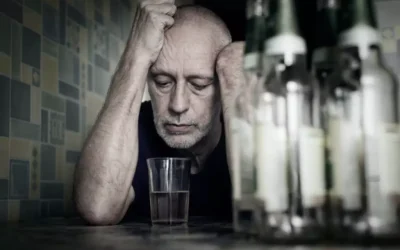The self-awareness that comes with realizing how bad things are and how damaging the substance abuse has been is how you can start to desire a better future for yourself. Acknowledging https://ecosoberhouse.com/ powerlessness over alcohol and drugs can be liberating for many people. It frees you up to focus your time and energy on things that are within your control.
Benefits of Understanding Powerlessness in Sobriety
Some people may be able to work through the steps relatively quickly, while others may take months or even years to complete the process. It’s important to remember that recovery is a lifelong journey and the 12 steps are simply one part of that journey. Are you ready to achieve liberation and strength over your destructive drinking habits? If so, you must admit defeat, become powerless, and embrace Alcoholics Anonymous (AA) guiding principles, starting with Step 1 of AA.
What are the 12 Steps of AA?

Having had a spiritual awakening as the result of these Steps, we tried to carry this message to alcoholics, and to practice these principles in all our affairs. I’m not going to dive into the medical explanation of why alcoholics are powerless over alcohol. The First Step does not say that you are powerless over your actions, your decisions, or your relationships; it says that you are powerless over alcohol/drugs. This is not an excuse for continuing down the same destructive path.
What Are the Principles in the 12 Steps of AA?
It was a statistical fact that alcoholics rarely recovered on their own resources” (p. 22). The purpose is to recover from compulsive, out-of-control behaviors and restore manageability and order to your life. It’s a way of seeing that your behavior is only a symptom, a sort of “check engine” light to investigate what’s really going on under the hood. Timmen L. Cermak, MD, is a psychiatrist who specializes in addiction medicine. He is the author of numerous books, including From Bud to Brain and Marijuana on My Mind. If you can acknowledge and accept those two things—that you have an addiction and it’s causing problems—then you have completed the First Step of Alcoholics Anonymous, and you have officially begun your recovery.
- Only then do they feel that powerlessness that comes from addiction.
- The dictionary defines powerless as being without the power to do something or prevent something from happening.
- The accountability and encouragement in meetings and therapy break the power of secrecy where addiction thrives.
- They were personally convinced that they were unable to control the effect alcohol had on them.
- The continued awareness this demands makes it easy to pair the step with its accompanying principle.
Admitting powerlessness is what reveals your true strength, and our committed staff is ready to help you find it. We offer peer-led recovery programs that are rooted in the 12-Step program of recovery from Alcoholics Anonymous. We believe that these steps are the foundation for building a healthy, sober life, and we have seen the good fruit of these teachings in the lives of our patients. To learn more about our vision and treatments, please contact us today. Being born and raised in Gaithersburg, Maryland, it was always a dream for James to start a program where he began his own recovery journey. Having faced addiction in his own life, and having worked through recovery, James truly understands what it takes to get sober and stay sober.
- As a brand, we prefer to use person-first language to avoid defining people by their condition and the stigma that may come with it.
- To acknowledge the way these substances have impacted your life is to admit that alcohol and drugs have made your life unmanageable and you can’t fix it on your own.
- Despite your best intentions, you’ve lost the ability to limit your intake of alcohol or drugs or stop the behavior.
- Many people suffering from alcoholism continue to find success in recovery by participating in AA’s program.
- Over time, you and your family lose control of your thinking.
The pseudo-science of Alcoholics Anonymous: There’s a better way to treat addiction – Salon
The pseudo-science of Alcoholics Anonymous: There’s a better way to treat addiction.
Posted: Sun, 23 Mar 2014 07:00:00 GMT [source]
The Twelve Steps are a set of guiding principles in addiction treatment that outline a course of action for tackling problems related to alcoholism, drug addiction and behavioral compulsion. The accountability and encouragement in meetings and therapy break the power of secrecy where addiction thrives. It helps foster accountability and is a profound place of support.
Get Help With Alcohol Addiction
You also have to be willing to make amends, which shows that you truly care for the people on your list. In step 4, you made a catalog of your past, and in step 6, you admitted them and released yourself from the guilt and shame. In step 8, you ask God, or another higher power, for forgiveness.
- Step 1 of AA acknowledges the need for members to hit rock bottom to understand alcohol addiction’s destructive nature.
- You have lived in denial, believing you can stop using alcohol at any time.
- Your inability to assert power over alcohol forces you to lie about your use of alcohol and even your whereabouts.
- This is part of our ongoing commitment to ensure FHE Health is trusted as a leader in mental health and addiction care.
- By studying the program, how it works, and each of its principles, you can determine if this type of program is ideal for you.

We have taken extreme measures to ensure that our own user is not going to be misused to harm any of our clients sites. Learn more about AA, and how its famous 12 Steps—especially Step 1—can set you on the path to recovery. In Steps 1 and 2, AA instructs members to strip themselves powerless over alcohol bare of ego and power. Step 3 involves putting yourself at the mercy of this higher power and moving forward for “Him” — or whatever your higher power may be — over the selfishness of addiction. This virtue is easy to understand when it comes to practicing it on a daily basis.
Only after admitting you are powerless can you begin to make changes in yourself. From step one, you can continue to the rest of the 12 steps and 12 traditions. “We admitted we were powerless over alcohol—that our lives had become unmanageable.” “We admitted we were powerless over alcohol—that our lives had become unmanageable. We came to believe that a power greater than ourselves could restore us to sanity.” Admitting powerlessness in sobriety can empower you to get the help and support you need to manage your life.
